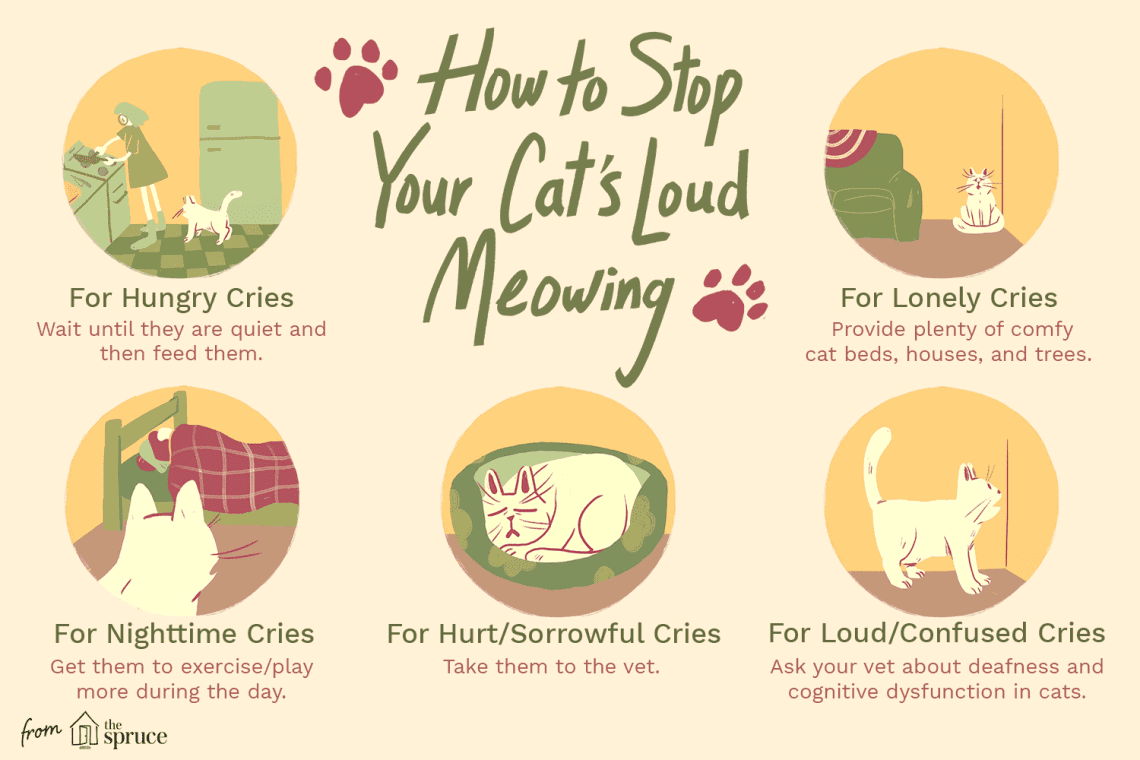
Why does a kitten constantly meow: reasons and tips
A new family member appeared at home, a small fluffy ball and … you lost sleep, lost your peace. The kitten meows all the time, asks for something, and you start to get nervous, annoyed because you cannot understand him. There is no need to get upset, just try to find out why your pet is behaving this way and correct the situation as soon as possible.
Contents
Causes of a kitten’s constant cry
The reasons are different, both physical and psychological.
Hunger
Demanding food from the owner, a small fluffy lump expresses concern and begins to meow loudly. Feed your pet something tasty he will calm down and will not annoy you with their “weeping”. Below is a sample diet for a small kitten.
- Meat. In cooking for a small pet, you can only use poultry, beef, lamb or horse meat. The meat must first be boiled. In no case do not buy pork meat for a kitten, it contains a lot of fat and helminths may be present.
- Fish. Despite the fact that all representatives of the cat family are not indifferent to this seafood, you should not get carried away with it. Frequent use of it can provoke urolithiasis in a kitten. Fish should be given to kittens boiled, pitted and no more than 1 time per week. Eggs can be given both raw and boiled.
- Dairy. Instead of whole cow’s milk, give the baby fermented milk products, such as fermented baked milk, curdled milk and kefir.
- A mixture of cottage cheese, milk and chicken yolk will definitely please your furry friend. Sometimes you can treat him with a small piece of cheese.
- At least 2 times a week, the kitten should receive chicken eggs. Their use has a beneficial effect on the growth of the pet and the shine of his coat.
- Required include a variety of cereals in the diet, except for “hercules” and legumes.
- Clean water must always be available.
Having eaten, the kitten will stop meowing and you can safely go about your business.
Difficult adaptation
A kitten, once in an unfamiliar environment, gets a lot of stress, feels anxiety and fear of the unknown. The kid, just separated from his mother and his brothers, misses them greatly, begins to meow loudly and pitifully. This situation is especially acute for very tiny kittens (up to 2 months of age). In this case, you will need maximum patience and calmness.
Create conditions for the baby that are close to those that were in the same place, next to the mother cat. Make a cozy house, prepare a warm heating pad wrapped in a piece of soft, preferably fluffy fabric. This will remind him of his mother’s warmth, the baby will calm down and fall asleep quietly. Surrounding the baby with care and attention, you will let him know that now he has another protector and breadwinnerwho will feed and protect him, just like his mother. As a rule, having got used to the new environment, the kitten completely relaxes and the “concerts” stop. Adaptation of kittens lasts about a week.
Lack of attention
Although domestic cats are independent creatures, they still need to feel loved, needed and not alone. The constant meowing of a kitten that has lived in the house for some time can be explained precisely by a lack of attention. Take a break from household chores for a while, play with the baby, talk, strive for contact, even if the baby is still a little afraid of you.
If you need to urgently go about your business, come up with some entertainment for the baby. You can buy in advance in the children’s world or in a pet store a plastic ball with holes, usually there is a simple rattle inside it, but you can “improve” the designby placing a homemade mouse there. The toy can be sewn from a piece of fur, filling it with padding polyester, sew on a tail using any leather or synthetic cord. The kitten will try to get the “mouse” out of the ball, which at the same time rolls on the floor, which complicates the task a little and makes the game more interesting. The game will take all the attention of the baby and he will stop meowing and “getting” you with his cries.
Health problems
If psychologically everything is fine, you should pay attention to the physical condition of the kitten, as various diseases can also cause the baby to constantly “cry”. Since small individuals have still weak immunity, they can very easily become infected and get sick. Necessarily take your pet to the vet and strictly follow his instructions.
- Helminths. One of the most common diseases of both small kittens and adult cats is helminthiasis. If the kitten constantly screams, for no apparent reason, it is necessary to check it for the presence of worms (helminths). It is they who can be the cause of wild pains and anxiety of the baby, and with his plaintive meow he tries to express his deplorable state. If helminths are found urgent action needs to be taken to destroy them, otherwise intestinal blockage may occur and, as a result, the death of the pet. Deworming of small kittens is allowed from 2 months of age. This procedure is painless, but very effective.
- Constipation. Another cause of constant meowing can be constipation. Feces accumulate in the intestines of the kitten, which causes him some inconvenience and pain. In this case you can try to help the kitten with a folk remedy – condensed milk (0 tsp). Having taken the “medicine”, your pet will immediately rush to the toilet.
- Fleas in kittens are a very serious disease that can lead to the death of a pet. Kittens, unlike an adult cat, are much more difficult to tolerate this disease: they quickly lose weight, anemia appears, and if urgent measures are not taken, the result can be disastrous. Since many chemical flea treatments cannot be applied to kittens, this problem can be solved by using a comb or comb. Comb out insects in water with the addition of any cleaning agent. In such an environment, they instantly die. This is very effective, and for small individuals, probably the only way to get rid of unwanted “neighbors”. Also you can use special preparations for kittens, but before using them, be sure to consult your veterinarian. The kid will be very grateful to you, he will become cheerful and active again and, finally, will save you from his constant cry.
- Toilet. If your pet is not litter box trained, meowing may mean a request to go to the bathroom. To avoid such a situation, potty train your kitten right away after it arrives in your home. Also, by shouting, your furry friend may “ask” for a walk. Buy a leash and walk with it for a couple of hours in the park. Living in a private house will make this task much easier: just let the kitten out into the yard.
Conclusion
Each sound “pronounced” by a cat carries certain information. By this, the animal tells you about its desires and needs. Some “talkativeness” is inherent in all individuals of the feline genus, but if your pet meows constantly, you should definitely pay attention to this and understand why the baby is meowing.





